 |
| Ruby-crowned Kinglet |
Another new bird for us both
and like the previous day's Blue-headed Vireo, this was an overwintering species
that we weren’t sure if we would catch up with, so it was great to ease the
pressure so early on. Similar to our Goldcrests and equally as small, this was
the American equivalent, and we only managed a few record shots before it had
disappeared high up in to the branches.
Our first port of call on our epic
two week Florida road trip was to be the excellent Merritt Island Nature
Reserve, a coastal haven that boasts an impressive number of birds and wildlife
within its boundaries. Putting our British nature reserves well and truly to
shame, Florida was full to the brim of pristine wildlife refuges, examples of
unspoiled, well maintained habitat and a true paradise for wildlife lovers,
birdwatchers and photographers alike. Whilst there, we visited several locations
on ‘The Great Florida Birding Trail’ – a fantastic idea that maps out all of
the hidden gems that Florida has to offer and makes them accessible for all to
enjoy.
 |
| The extensive wetland habitat throughout Florida was full of birds |
Before even reaching our
destination of the Merritt Island Visitor Centre, the new birds kept rolling
in. Our first ever Wild Turkey feeding on the side of the expressway was
extremely exciting, while a chance stop off at some suitable looking habitat
near St John’s River provided our first true taste of what birding in Florida
has to offer. Whilst only there for a quarter of an hour or so and not moving
from the lookout point the entire time, we racked up an impressive number of
species. Common Yellowthroats, Red-winged Blackbirds and both Common and
Boat-tailed Grackles called and flitted through the reeds, while a pair of
Black-necked Stilts were our next new birds of the trip. Feeding in the murky
water way out in front of us we managed some decent scope views, while a second
Wood Stork provided the chance to get a better look at this distinctive
species.
 |
| Boat-tailed Grackle |
A small brown sparrow feeding
in the grass at the side of the water turned out to be our first Savannah
Sparrow, one of a handful we saw during our time in Florida.
 |
| Savannah Sparrow |
Relatively drab
looking in appearance, we managed some decent shots as it hopped along the
rocks, before a bright yellow thrush-sized bird took our attention away. Trying
to work out what it could have been, all was revealed when our first Eastern
Meadowlark of the trip crept in to view. Much larger than I expected (more the
size of a Quail) we watched as a second bird flew in to view, proceeding to
sing it’s beautiful, fluty and distinctive song from the top of a nearby
conifer.
 |
| Eastern Meadowlark |
A large grey bird hovering
over the lake soon caught my attention – reminiscent of a bird of prey of some
sort. Alerting Alex and struggling to determine what it was, all was
revealed when the bird suddenly plunged into a powerful vertical dive straight
into the water – Belted Kingfisher!
 |
| Belted Kingfisher |
This was a species we had been looking
forward to catching up with, and a bird that despite seeing in many photos, was
significantly larger in real life than pictures portray. Similar in size to a
Jay, we saw several of these charismatic aquatic hunters during our time in
Florida, and they became a regular sight perched on telephone wires up and down
the roads.
St John’s River also revealed
our first American Alligator basking in the sun on the side of the bank and not
moving a muscle – thankfully a stretch of water separating him and us. Further
bubbles and movement in the murky depths hinted that there may have been more
than just the one present, and being our first alligator in the wild, we
stopped to admire and take photos of this prehistoric reptile (whilst hoping
none lurking in the shallows fancied us for lunch).
 |
| American Alligator |
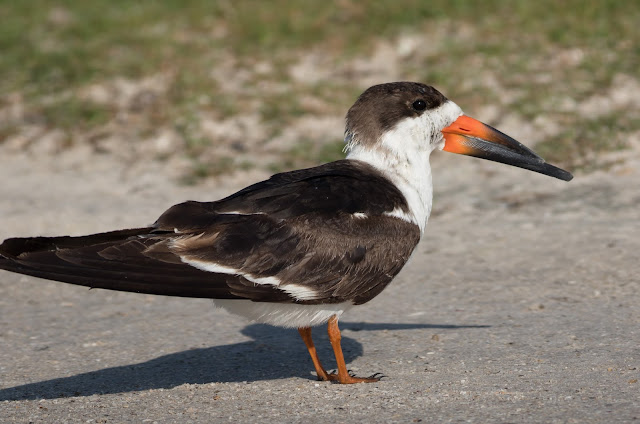 |
| Black Skimmer |
A foraging American White Ibis taking
advantage of the scraps left behind was our next new bird of the trip,
providing fantastic views and offering a great opportunity to get a good look
at this beautiful bird up close. Abundant throughout Florida, White Ibis were numerous at almost every site we visited, and we frequently saw flocks of birds flying over whilst driving from location to location.
 |
| American White Ibis |
 |
| Western Willet - we saw just one individual on the way in to Merritt Island - told apart from the more familiar Eastern Willets by the paler colouration and longer, thinner bill. Currently just a subspecies of Willet, this is a potential split for the future. |
Arriving at Merritt Island
Visitor Centre, our first port of call was to stop off at the feeders in an
attempt to locate the gorgeous Painted Buntings that are regularly reported
from here in the winter months. A quick scan of the surrounding ground revealed
a single female, quite timid in comparison to the boisterous Common Grackles
and Brown-headed Cowbirds that were also busying themselves below.
 |
| Female Painted Bunting |
Not quite
the rainbow coloured male I was hoping for, her green hues were still subtly
beautiful, and we enjoyed watching as she fed shyly on the seed.
 |
| American Black Vulture - this confiding individual happily sat on the Visitor Centre roof! |
Exploring the compound some
more, we came across our first butterflies of the trip – a White Peacock settled on the ground allowing for some
photos while several magnificent yellow and black swallowtail species flew
powerfully over the reeds.
 |
| White Peacock |
Heading further out on to the boardwalk and in to
the trees, we experienced more lepidoptera delights, as delicate and
intricately patterned wings fluttered around us in scenes more reminiscent of a
tropical butterfly exhibit back home – incredible. Not particularly experienced
in American butterfly ID, Zebra Heliconian was the only species I could
positively put a name to, the bright yellow and black markings distinctive.
 |
| Zebra Heliconian (Photo taken in Conwy Butterfly Jungle) |
 |
| We also saw a single Glasswing butterfly in the forested area near the Visitor Centre (Photo taken in Conwy Butterfly Jungle) |
Turning my attention to several reptiles perching motionless on the tree trunks
surrounding the path, a Brown Anole showed
off the ruby red colours of its throat fan, while a nearby Green Anole (the
only species of anole native to the US) posed obligingly for some photos – the
fauna of America really was fantastic!
 |
| Brown Anole |
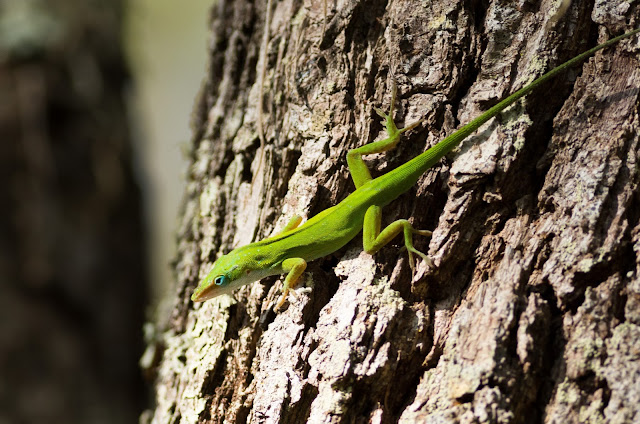 |
| Green Anole |
With a calling Carolina Wren
not playing ball in its elusive game of hide and seek with us, and with a
further stake-out at the feeders for my hoped for male Painted Bunting drawing
a blank, we headed back to the car ready to move on to our next target – the
endemic Florida Scrub Jay. Investigating the trees surrounding the car park
before we left, I caught sight of a flash of bright yellow amongst the leaves,
followed by bold black and white. Instantly calling it is a Yellow-throated
Warbler I hastily backtracked, wondering whether it could have been a male
Yellowthroat instead - a much commoner migrant. My instincts had been right
however, and seconds later a glorious adult Yellow-throated Warbler emerged out
in to the open, the sunshine yellow throat framed by humbug black and white
markings.
 |
| Yellow-throated Warbler |
For the next quarter of an
hour we watched this incredible warbler as it foraged in the trees above us,
providing stunning views at close range. Actively feeding and being constantly
on the move however made getting any reasonable shots very tricky indeed!
One of the rarer warblers we
were hoping to catch up with, and originally planning to head up to Gainesville
at the end of our trip specifically to search for this species on its breeding
grounds (we were definitely glad we had changed our plans now after seeing it
on the first day!) it was great to have nailed this uncommon warbler on our
first day!
Moving on to our next port of call at the Scrub Ridge Trail, an unfortunate half hour delay stuck at the end of the visitor centre drive due to an oncoming ‘wide load’ was made somewhat worthwhile by point blank views of a pair of foraging Northern Parulas. Extremely small and dainty, we admired their tropical throat markings and before long were thankfully soon on our way again, hoping to catch up with the only endemic to the Sunshine state – the enigmatic Florida Scrub Jay.
 |
| Bella Moth - one of the only species of moth we saw on our trip. |
 |
| Merritt Island was great for butterflies, including this Mangrove Buckeye we spotted on the Scrub Jay Loop |
Exploring the well-known Scrub
Jay loop in an effort to locate any Jays sadly drew a blank however, although
we did manage to add two new birds in the form of a flyover Roseate Spoonbill
and a foraging Reddish Egret in one of the pools. Running around in an
increasingly crazy fashion, we could only assume this was some sort of hunting
strategy for Reddish Egrets, as several individuals later on in the trip also
adopted this strange pattern of moving.
 |
| Reddish Egret |
With a singing Marsh Wren back
at the car park not revealing itself from the depths of a thicket of scrub
despite intensive pishing from Alex, and armed with fresh gen that the Florida
Scrub Jays liked the left hand path along the water, we headed off down the
Scrub Ridge Trail in pursuit of our target. It didn’t take long before we were
successful – Alex soon spotted a fine adult perched on a bush further down the
path, and after getting some reasonable scope views we crept off down the trail
in an effort to get closer to this gorgeous bright blue endemic.
 |
| Florida Scrub Jay |
 |
| The path we eventually found our Scrub Jays on |
Getting to
within a few metres and soon noticing a second individual over to our right, we
were treated to fabulous views of these showy birds, clearly unperturbed by
human presence (some will even land on birders heads and cameras!) and showing
incredibly well, often popping up in the shrubs right next to us.
Able to
relax, the pressure was now off after what had been an unsuccessful and
worrying few hours searching earlier – we couldn’t visit Florida and dip Scrub
Jays!
 |
| Spot the Scrub Jay... |
Endemic to the state of
Florida having been split from the Scrub Jay complex, these were one of our
main targets of the trip, and it was an amazing experience to get such
incredible views of these extremely special birds.
Leaving the Scrub Jays in
peace, and with the locals informing us that the Manatees were back at the special
Manatee watch point just 5 minutes away, we quickly headed off in an effort to
locate these charismatic and gentle aquatic mammals. A relative of the
elephant, Manatees favour the warm shallow waters and bays of Florida,
returning to Merritt Island in the spring after wintering in several well-known
localities in the warm springs of Florida.
 |
| The Manatee watch point! |
A species I was desperate to
catch up with, I was thrilled that they were back - having wondered whether we
would be a tad too early. Thankfully we weren’t, and we were soon enjoying
point blank views of these huge and unmistakable mammals, around 10 moving
around in the water right in front of us, splashing their tails and rising up
to the surface to breathe. Absolutely incredible, and for me, one of the
highlights of the entire trip.
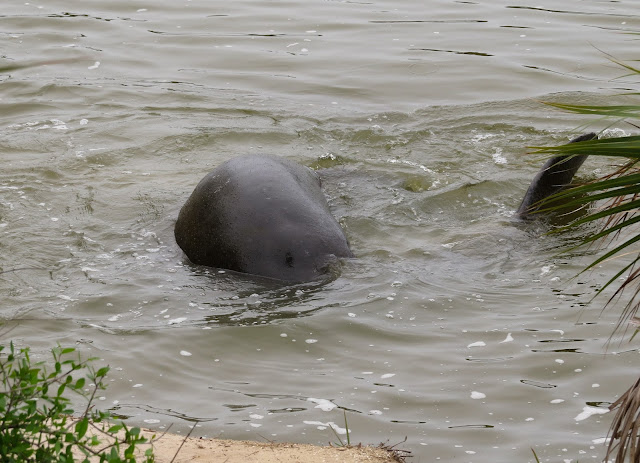 |
| Manatees! |
No-one is sure why the
Manatees return to the watch point each spring. It may be because there is an
abundance of food in the canal at Merritt Island or it could simply be that the
herd is site faithful – regardless, it was fantastic to see these unusual
animals up close and it was an amazing wildlife experience.
Drawing my eyes away from the
Manatees frolicking in the water below, we soon had our next lifer of the trip
– a small flock of Brown Pelicans were fishing in the canal under the bridge
with several more resting on the railings.
 |
| Brown Pelican |
Wild Pelicans were something I had
been hugely looking forward to seeing in Florida, having never experienced one
in the wild before, and this was one of two species of Pelican we were hoping
to see over in the states – for me, the more attractive out of the two.
 |
| Brown Anoles also scurried over the rocks at the Manatee watch point |
After several more minutes
admiring the Manatees we headed off to our final point of call for the day –
Black Point Wildlife Drive. A 7 mile one-way driveable trail that leads through
the lush waterways of Merritt Island, this was one of the best spots on the
whole reserve to experience the wealth of birdlife up close.
 |
| Anhinga |
Several Little Blue, Green and
Tricoloured Herons fished amongst the shallows, while familiar Snowy Egrets
hunted stealthily and patiently in the search for unsuspecting prey, often joined
by much larger Great Egrets while Alligators submerged themselves in the water
below.
 |
| Little Blue Heron |
 |
| Tricoloured Heron |
We soon encountered another
Florida speciality and our next lifer – a Mottled Duck was dabbling in the
deeper water on one of the lagoons, another species we had wondered how
difficult it would be to connect with.
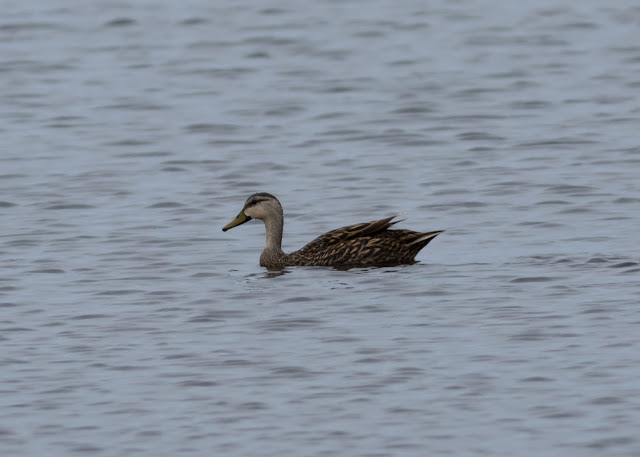 |
| Mottled Duck |
Often hybridising with Mallards and
producing intergrade offspring, pure birds can be readily distinguished by
their bright yellow bills, a small distinctive black notch at the base of the
bill and a clear cut, paler head than the rest of the body – all
characteristics that our bird displayed. Unfortunately, the Mottled Duck
population is in danger of becoming displaced by Mallards through
hybridisation, similar to the situation of White-headed Ducks and Ruddy Duck
influence in Europe.
Heading further along the
drive we soon spotted our first American Coots of the trip – bobbing in the
water in large numbers and congregating to feed in the shallow pools.
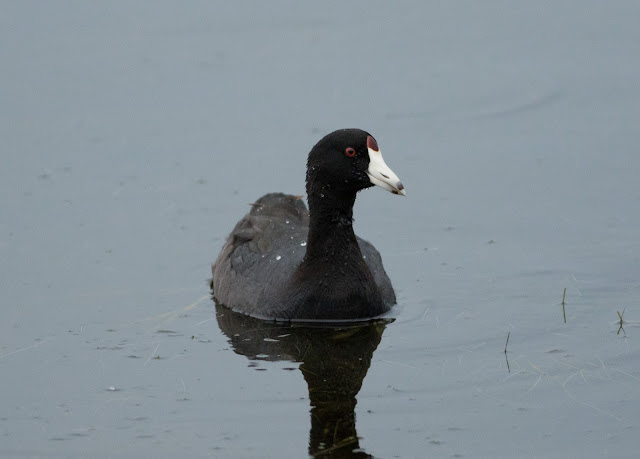 |
| American Coot! |
Having
missed the Loch Flemington bird 2 years ago, it was great to finally see in the
flesh what has become a bit of an iconic bird for me…
A Common Gallinule foraging in
the reeds was another new bird in quick succession, almost identical to the
Common Moorhens back in the UK, but a species that has recently been split by
the ABA. Both American Coots and Common Gallinules were incredibly abundant
wherever we visited in Florida, and were most certainly two of the commonest
species we encountered out there.
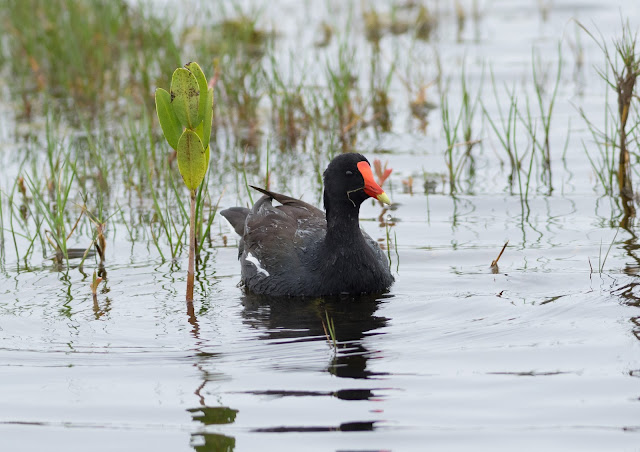 |
| Common Gallinule |
Driving further, rounding a
bend revealed our first American White Pelicans of the trip – two large and
majestic individuals sat in the middle of the water resting, accompanied by
several bright pink Roseate Spoonbills.
 |
| American White Pelicans with Roseate Spoonbills |
Larger than the Brown Pelicans we had
seen earlier on in the morning, we were expecting to see many more of these
peculiar birds, with huge numbers often reported from Merritt Island in particular,
but unusually, apart from a large distant flock on the pools at Three Lakes WMA
(another site we visited further on in our trip), these were the only two that
we saw.
 |
| Black-necked Stilt |
With the water now becoming
much shallower and revealing the mudflats and sandy banks underneath, the
herons, egrets, ducks and Anhingas gradually shifted to an abundance of waders
– more Black-necked Stilts foraged close by while Semi-palmated Plovers,
Dunlin, Willet, Stilt and Semi-palmated Sandpipers all scurried across the mud feeding
frantically.
 |
| Semi-palmated Plover |
 |
| Long-billed Dowitcher |
A small flock of Long-billed Dowitchers sadly didn’t hold any
Short-billed (the Dowitcher species I was yet to see) but it wasn’t long before
we had nailed another of our targets – Marbled Godwit.
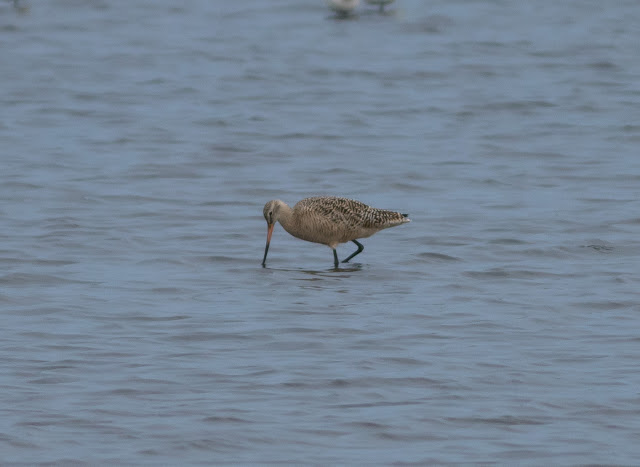 |
| Marbled Godwit |
Wintering at Merritt
Island, these beautiful speckled Godwits would be moving on in the next few
weeks, and we had luckily timed our trip to catch the last of the wintering
birds as well as the first of the migrants.
Exploring the trail further,
several more Mottled Ducks posed well for photographs, and an extremely
confiding Roseate Spoonbill scooping the water with its characteristic shaped
bill came so close that it wouldn’t fit in my 400m lens.
 |
| Mottled Ducks |
 |
| Roseate Spoonbill |
At this point however, the
heavens opened, and we experienced our only torrential downpour of the trip
(not quite the Sunshine state anymore!). With the clouds turned a menacing
shade of black and with thunder and lightning cracking down from directly
overhead, we retreated to the safety of the car, enjoying a spot of lunch whilst
admiring another Reddish Egret dart amusingly for fish as a lone Black Skimmer
swooped low over the water, its incredible bill stretched wide open.
 |
| Reddish Egret examining it's reflection |
 |
| Skimming in the rain... Black Skimmer amongst the raindrops |
With the rain showing no sign
of abating we continued on, and nearing the end of the trail, Alex finally
found his sought after American Avocet.
A lone individual feeding in the deeper
water, the upturned bill mirrored our Pied Avocets in Britain (but lacking the
jet black cap ours sport), and just coming into breeding plumage there was also a
hint of orange coming through on the breast. With just two being reported here
recently (the much larger wintering numbers had diminished substantially over
the past few weeks) we soon caught up with the second bird further around the
bend, completely unbothered by the heavy raindrops now hammering our windscreen.
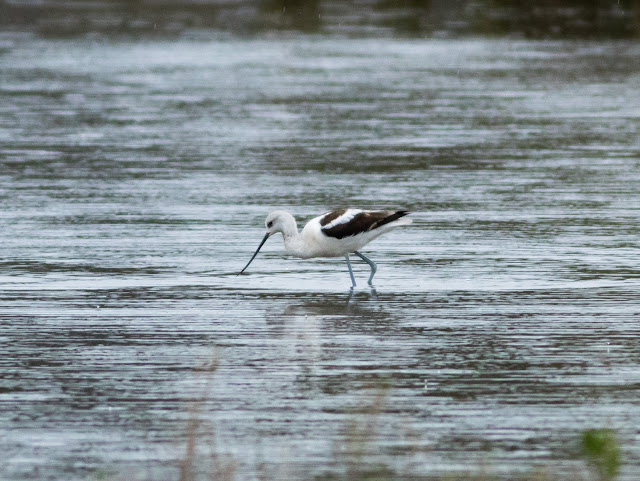 |
| American Avocet |
With time marching on and
having reached the end of Black Point Wildlife Drive, we decided to head back to the
entrance ready for the drive back to Orlando, reversing mid-way to stop and
admire a group of Wild Pigs foraging in the swamp.
 |
| American Black Vultures |
 |
| Red-shouldered Hawk |
Stopping to take photos of a huge gathering of American Black Vultures on a nearby power
building also proved to be a good call, and resulted in our first definite
Red-shouldered Hawk of the trip, along with another fine lifer in the form of a
charming Common Ground Dove feeding on the gravel path. Much smaller than we
had anticipated, this extremely quaint dove never stopped still, the scaly
belly and short dumpy appearance distinctive compared to the long and slim
Mourning Doves we had been seeing.
 |
| Record shots of the Common Ground Dove |
One feature we soon noticed was that Belted Kingfishers lined the
powerlines leaving Merritt Island, taking advantage of these man made perches
to hunt for prey in the ditches below.
One individual proved to be particularly
confiding, and we enjoyed excellent views as it dismantled and devoured a fresh
caught crayfish in front of the car.
 |
| Belted Kingfisher |
Deciding to stop off at the
Black Skimmer layby from earlier also proved to be another good call and
resulted in a flock of roosting Royal Terns on a distant sand bank, while a
summer plumaged Great Northern Diver (Common Loon) floating further out in the bay was an
unexpected surprise.
 |
| Great Northern Diver (Common Loon) |
Despite the day coming to a
close, the birds just kept on coming – a small grey bird perched on a wire near
the sea front houses proved to be a Loggerhead Shrike – our first of a handful
seen on the trip and superficially similar to our Great Grey Shrikes in
appearance.
 |
| Loggerhead Shrike |
Several Fish Crows cawing provided us with great views of a corvid
we had only seen briefly flying over in New York, and it was great to watch as
they came to blows with the White Ibises and Laughing Gulls foraging for scraps
in the beach car park.
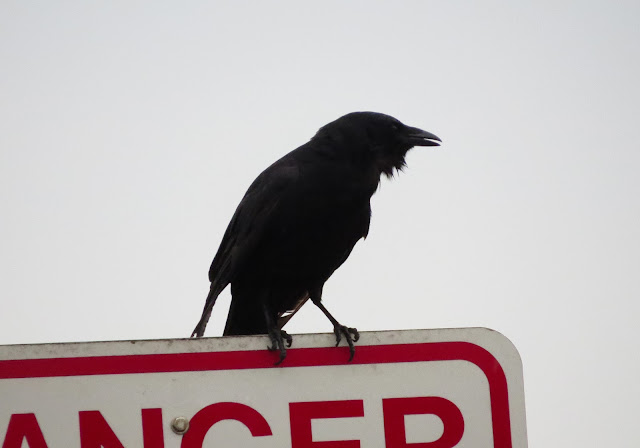 |
| Fish Crow |
 |
| Laughing Gull |
With a hugely successful first
full day in Florida under our belt, we battled back through the Orlando traffic
for a well-earned rest at the hotel before a delicious bite to eat of TGI
Fridays Jack Daniels chicken (what else?! – our hotel was coincidentally 4
minutes away from my favourite restaurant), looking forward to what the next
day would bring and to commence the hunt for my most sought after bird of the trip –
Swallow-tailed Kite.






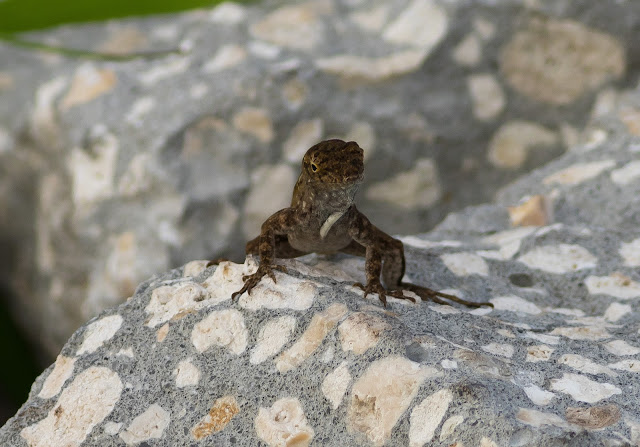


























































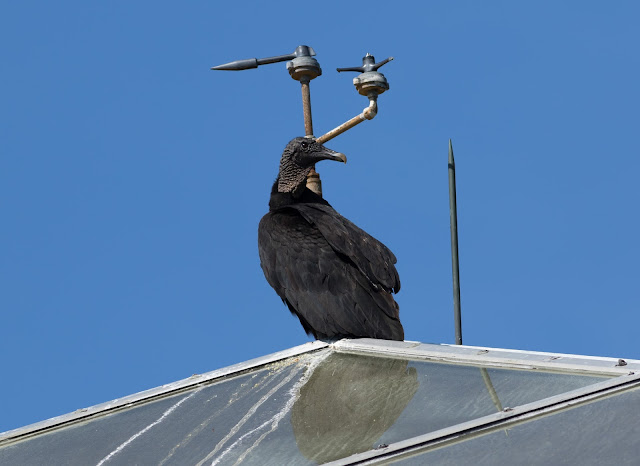









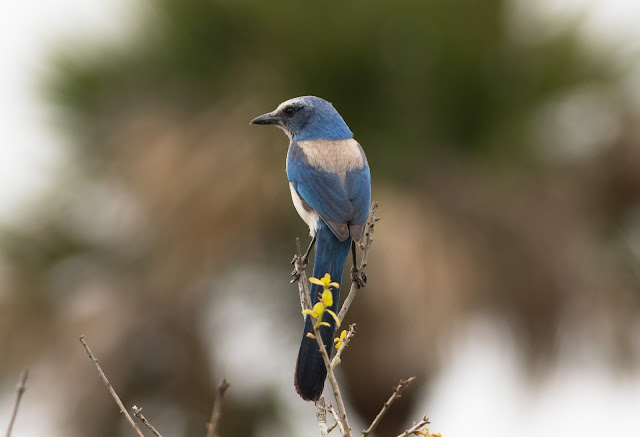


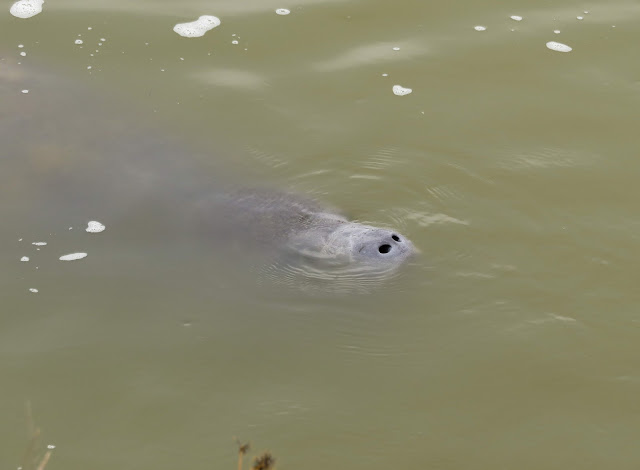
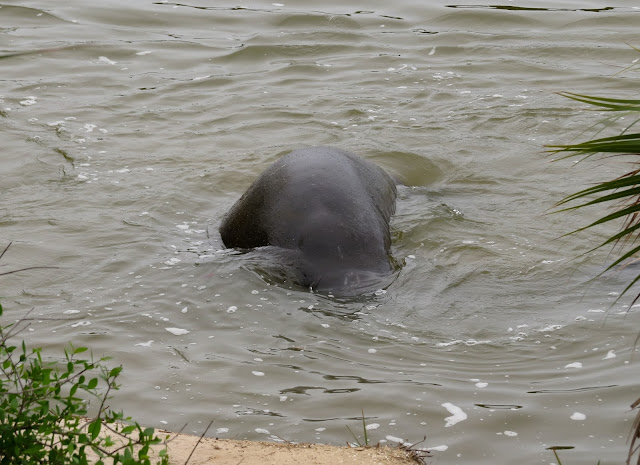



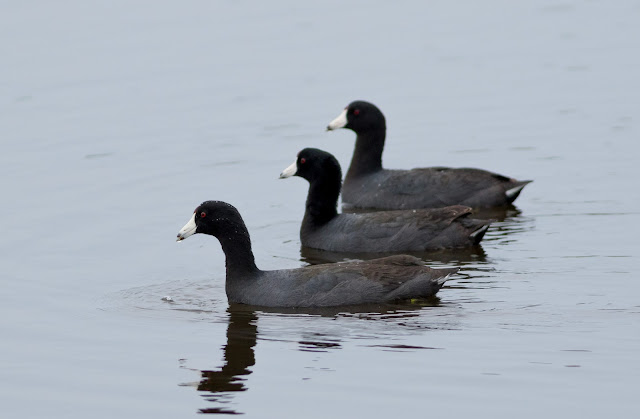



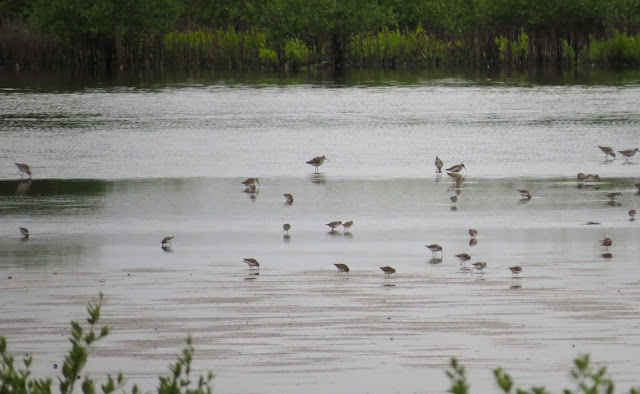

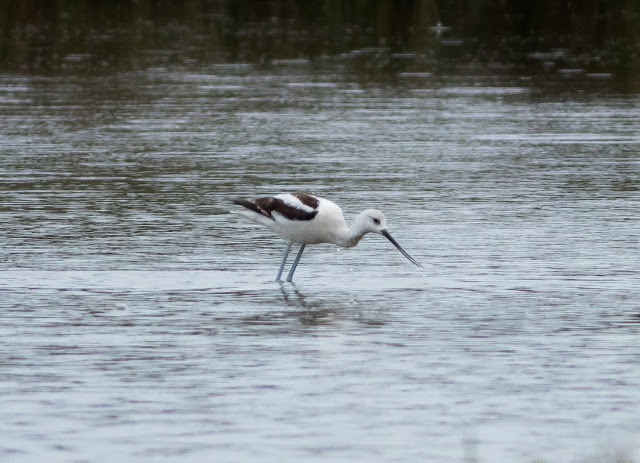





No comments:
Post a Comment